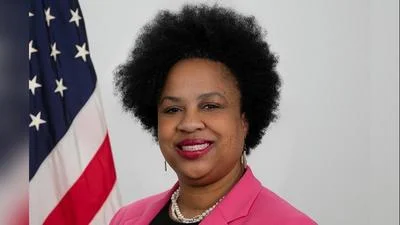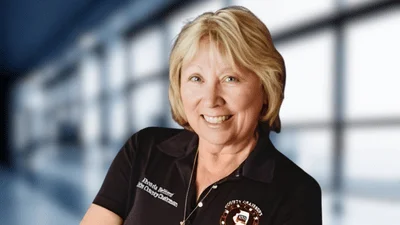Illinois State Board of Education Education Policy Planning Committee met Nov. 1.
Here are the minutes provided by the committee:
I. Roll Call
Chairperson Susie Morrison brought the meeting to order at 12:30 p.m. Roll call was taken, and a quorum was present with three members. Chair Morrison was physically present; Dr. Donna Leak and Jaime Guzman were present via video conference.
Committee Members Present
Chairperson Susie Morrison
Dr. Donna Leak
Jaime Guzman
Committee Members Absent
None
Other Board Members Present
Dr. Steven Isoye, Chair of the Board
Staff Present
Dr. Carmen I. Ayala, State Superintendent
Kirsten Parr, Board Services Coordinator
Kim Clarke, Executive Assistant to the State Superintendent
Dr. Brenda Dixon, Research and Evaluation Officer
Carisa Hurley Davis, Director of Early Childhood
Amanda Elliott, Executive Director of Legislative Affairs
Dr. Jason Helfer, Deputy Instructional Education Officer
Krish Mohip, Deputy Operational Education Officer
Christine Paxson, Director of ESSA/IL-EMPOWER
David Turovetz, Director of Charter Schools
Melissa Oller, Operating Officer
Tassi Maton, Internal Audit Officer
Robert Wolfe, Financial Officer
Enkhzul Lee, Director of Federal and State Monitoring
Norma Moore, Supervisor in Early Childhood
Dr. Sean Clayton, Director of Assessment
Irma Snopek, Policy and Communications Officer
Jeremy Duffy, Legal Officer
II. Public Participation
There was no public participation.
III. Approval of the October 6, 2022, Meeting Minutes
Dr. Leak made the motion for the Education Policy Planning Committee to approve the October 6, 2022, meeting minutes. Mr. Guzman seconded the motion, and it passed by a unanimous roll call vote.
IV. Presentation
A. 2022 Illinois Report Card Overview
Dr. Ayala presented the overview.
Dr. Ayala started by highlighting positive gains in college and career readiness, student growth, and the teacher workforce. She also noted increases in chronic absenteeism, a trend which was common in other states. She discussed the use of federal funding for learning renewal efforts, with support provided through direct relief to districts and targeted programming from ISBE.
She shared an overall increase in graduation rates since 2018, driven by significant increases for Black and Hispanic students. Data also showed that ninth graders had rebounded in 2022 after dropping in 2021. Rates of students taking Algebra 1 in eighth grade had improved, but not rebounded to 2019 levels, since 2021. Community college remediation rates dropped in 2022, but enrollment in postsecondary education has continued to decline since 2010, which is aligned with national trends. She discussed affordability as a barrier but noted findings that indicate costs of postsecondary education are compensated by gains in potential future earnings.
She discussed Student Growth Percentile (SGP) measures. With 2019 as a baseline, the average 2022 baseline SGP had recovered from a drop during 2021. Overall accelerated growth in 2022 appears to result directly from investments made at state and local levels. She noted that this acceleration was not uniform across the state and that studying the districts with schools in the higher percentile of growth could prove beneficial to recovery efforts elsewhere.
Participation rates in assessments in 2021 was significantly lower than typical and disproportionately white, so the agency hypothesizes that the reported 2021 proficiency rate is an overestimate. Dr. Ayala said this is one potential reason why 2022 proficiency rates were slightly lower than 2021. She noted that Illinois assessment standards for proficiency are higher than other states. Illinois students’ assessment scores were higher than national averages, which suggested success in learning recovery efforts.
She shared that the overall student attendance rate had decreased to 90.8% in 2022, but noted that gains in student performance persisted despite this. She shared that chronic absenteeism had increased, with 30% of students being chronically absent. Black and Hispanic students had particularly high rates of absenteeism (47.9% and 36.1%, respectively), but all groups had increases.
The total number of teachers had increased overall. Dr. Ayala noted that despite the increase, teacher shortages persisted in underfunded and chronically underfunded schools, specifically for special education and bilingual positions. She shared that initiatives for diversity in recruitment and retention for teaching were underway. She discussed substitute teacher shortages, noting that over 30% of teachers missed 10 or more school days in 2022, a significant increase. She noted ISBE’s changes to licensure requirements for substitute teachers to increase accessibility of those positions. She shared steady gains in teacher retention, and that the average teacher base salary continued to steadily increase.
Dr. Ayala discussed updates to annual summative designations, saying that changes were made to 2022 accountability metrics to account for the impact of the pandemic, and that summative designations in 2022 might not be comparable to previous years. She shared that development of ISBE’s Equity Journey Continuum tool continues. It serves as an informational tool for districts to identify and address equity gaps in their schools.
Chair Morrison said that challenges remained, but there are many positive outcomes to celebrate. She extended appreciation to the superintendent and ISBE staff for facilitating vital programs, and to district teachers and administrators for working hard throughout the pandemic to continue educating students.
Dr. Leak emphasized praise for the efforts of staff in districts. She highlighted the value of digital equity efforts to address growing technology needs in particular. She discussed the value of increased opportunities for engagement with families and being able to help students meet their needs.
Mr. Guzman echoed praise for teachers, highlighting efforts for teacher development and retention from ISBE.
Mr. Guzman asked about the lower enrollment for early childhood programs. Dr. Ayala said it was partially due to decreases in birth rates and population migration to other states. She emphasized the urgency of enrolling children in early learning programs as soon as possible. Mr. Guzman agreed, noting the significance of promoting these opportunities. Dr. Ayala discussed an ISBE campaign for early childhood enrollment.
Dr. Leak asked if a measure for Algebra 1 in eighth grade captured accelerated learners who had taken it earlier. Dr. Dixon confirmed that it did. Dr. Font noted that this was true for My Data Dashboard as well, including for other course enrollment benchmarks.
Dr. Leak discussed proficiency measures and asked if higher standards in Illinois at the elementary level were correlated with higher performance on national-level tests in high school. Staff said they could follow up with information.
Dr. Leak discussed the “Exemplary” status being based on the top 10% and not on a baseline and asked if the exclusivity of the metric was productive to statewide goals in achievement. Dr. Helfer noted that capturing the lowest 5% of schools was set by federal statute, but that the accountability metrics of upper levels were determined by the state and could potentially be revised in future amendments to standards. Chair Morrison said that a standards-based system that is more inclusive of “Exemplary” could be more productive.
Dr. Leak asked about teacher attendance and how much it was affected by attendance exemptions related to COVID-19. Dr. Ayala said staff could follow up on what exactly was included in the exemption.
Dr. Leak asked about disaggregating teacher shortage data by district categories to determine how low-income, high-minority, and rural districts were performing in these areas. Chair Morrison agreed. Dr. Leak discussed the importance of acknowledging shortage concerns in the field.
Dr. Isoye thanked Dr. Ayala for her role in contextualizing the Report Card.
Chair Morrison asked for information about how access to Advanced Placement (AP) and dual enrollment courses looked statewide and asked about performance on AP exams statewide, and staff said they would follow-up.
Dr. Ayala emphasized the common thread of equity in many of the questions asked and the importance of continuing to ensure all Illinois students have access to quality education.
B. Illinois Assessment of Readiness Update
Dr. Clayton presented this update.
He shared an overview of the recommendations from collaboration with the Center for Assessment as the focus for this presentation and noted the current contractual status for Illinois Assessment of Readiness (IAR) content and format.
On Recommendation 4: Accelerate and Improve Assessment Reporting, Dr. Clayton noted that preliminary results for the 2023 IAR would be available 30 days after the final test, and final results would be available 30 days after the preliminary results were released. He noted that long-form answers took longer to assess, and earlier reporting timelines could limit data from these questions. Individual Student Reports provided to schools and parents were changed to help contextualize the results on school and state levels and to better display their academic growth. He shared a video, which is available to parents, that would more clearly communicate the goals of the IAR. He shared that efforts are in place to determine potential room for improvement in the reporting timeline and model.
On Recommendation 6: Explore Strategies to Shorten End of Year (EOY) Test, he highlighted previous efforts that have been made to reduce time for assessments. He said that changes for the 2022 EOY Test would need to have been taken in fall of 2021. He discussed the potential impacts in reducing opportunities for long-form questions, which could reduce the reliability of the test and usefulness for assessing student performance. He said changes could also affect comparisons for SGPs. Dr. Clayton said that ISBE would need to discuss next steps on this recommendation with the Technical Advisory Committee (TAC), assessment vendors, and the U.S. Department of Education.
On Recommendation 7: Consider Transitioning to an Adaptive Design, he said that the current contract allows for the possibility to implement this design. He noted that the TAC would need to determine a general assessment design, and math/English language arts subject specialists would need to cultivate content for an adaptive design before implementing this approach.
He concluded by stating that the Assessment Department would continue to work with partners to determine potential avenues for improving assessment.
Chair Morrison thanked Dr. Clayton for the presentation. She noted that ISBE has done surveys on potential recommendations for assessment and that some individuals have expressed that action on concerns presented there had been limited. She asked if there was a written work plan for making changes to the assessment. Dr. Dixon said that changes could be made through specifications in a contract with assessment vendors or implemented sooner if a desired change fell within the realm of a current contract.
Chair Morrison asked if there was a timeline for potential changes, and Dr. Dixon said that the State Assessment Review Committee (SARC) has not yet had a quorum to determine a timeline. Chair Morrison asked what plans were for SARC discussion, and Dr. Dixon said that dates were being determined for an in-depth discussion and determination on the topic.
Staff and committee members discussed the importance of stakeholder engagement, and the urgency for a quorum on SARC.
Mr. Guzman encouraged staff to research the feasibility and expected costs of implementing recommendations, with the hopes that Board members are prepared for action on assessment changes when the time comes.
Dr. Leak emphasized the importance of feedback, encouraging virtual meetings if needed for full SARC participation. She also discussed the value of accelerated assessment reporting for districts with school years ending before the current final date, even if the information provided at that time is not comprehensive of each element of the test. She said that it could inform summer program opportunities for students as well.
Chair Morrison asked for follow-up on any changes to SARC meeting plans.
V. Review of November Board Action Items
A. Approval for Publication – Part 269 (Freedom Schools Grant Program) New Part
There were no questions on this item.
B. Contracts & Grants Over $1 Million – Approval of the Release and Award of FY 2024 Request for Proposals Early Childhood Block Grant - Prevention Initiative 0-3, Preschool for All 3-5, and Preschool for All Expansion Years 3- 5 and extension of FY 2023 current grantees of Early Childhood Block Grant - Prevention Initiative 0-3, Preschool for All 3-5, and Preschool for All Expansion Years 3-5
There were no questions on this item.
C. Contracts & Grants Over $1 Million – Approval of Preschool for All/Preschool for All Expansion Monitoring
There were no questions on this item.
D. Contracts & Grants Over $1 Million – Approval of Request for Sealed Proposals for Early Childhood Community Systems Development
There were no questions on this item.
E. Contracts & Grants Over $1 Million – Request for Proposals for Early Childhood Block Grant: Preschool for All/Preschool for All Expansion Training and Technical Assistance: Three to Five Years
There were no questions on this item.
F. Contracts & Grants Over $1 Million - Approval of the 1003 School Improvement Grants Ms. Paxson discussed this item.
Chair Morrison asked for updates on earlier iterations of the grant at a future meeting. She also asked for a list of schools with Targeted designations including details on data leading to that designation and a list of new and any former program partners, expressing concerns about some potential limitations to services in rural regions. She asked for discussion on expectations for schools of concern, particularly chronically underperforming schools.
Mr. Guzman noted the uniform size of the planning grant funding and asked whether or not that would be sufficient to cover items across schools. Dr. Paxson said that the amount had been shown to provide the opportunities needed for the planning phase. Chair Morrison asked if external evaluations had supported this, and Dr. Paxson said that it had, but could provide more detailed information. Chair Morrison expressed a particular concern for schools facing greater challenges.
VI. Review of December Board Action Items
A. Contracts & Grants over $1 Million – Approval of Senate Resolution 774 – Performance Evaluation Reform Act Dr. Helfer discussed this item.
Chair Morrison asked about the end term of the advisory group. Dr. Helfer was not sure, but stated that it was listed in statute. Mr. Guzman said from research the expected end time was June 30, 2024. Dr. Leak asked if there was a need to extend term of the advisory group past the date of the final report. Chair Morrison noted that the legislature is responsible for determining the term.
B. Contracts & Grants Over $1 Million – Approval of Preschool Development Grant Birth – 5, Year 3 - National Louis University
Ms. Hurley Davis discussed this item. There were no questions.
C. Contracts & Grants Over $1 Million – Approval of Preschool Development Grant Birth – 5 3-Month Extension for the Illinois Network of Child Care Resource and Referral Agencies
Ms. Hurley Davis discussed this item. There were no questions.
D. Approval of Renewal Decision for Elgin Math and Science Academy Charter School
E. Approval of Renewal Decision for Horizon Science Academy – McKinley Park Charter School
F. Approval of Renewal Decision for Horizon Science Academy – Belmont Charter School Mr. Turovetz discussed these items. He noted that evaluations and recommendations from external and internal reviews would be available by next week and that these would lead to final recommendations to the superintendent. There were no questions.
VII. New Business: Items for the Next Agenda
Chair Morrison noted an interest in discussions on statewide systems of support.
Dr. Leak said that more discussion points might come after receiving follow-up to questions asked by committee members from this meeting.
Mr. Guzman said more information about the charter renewal findings and their process could be useful to have before Board action on recommendations.
VIII. Next Meeting: December 8, 2022
IX. Adjourn
Mr. Guzman made a motion to adjourn. Dr. Leak seconded the motion, and it passed by a unanimous roll call vote. Chairperson Morrison adjourned the committee at 2:51 p.m.
https://www.isbe.net/Documents_Board_Meetings/20221101-EPP-Minutes.pdf





 Alerts Sign-up
Alerts Sign-up